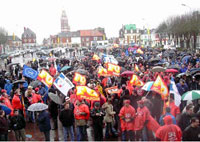Civil servants join strikes in France
After a week of transport strike that caused chaos on French railways civil servants began a mass walkout throughout France. Authorities state that it will not effect planned reforms.

Up to half of the country's teachers could stay off the job in support of higher salaries and job security, officials have said. Postal and tax services were also affected. Flight disruptions were expected as air traffic controllers are also civil servants.
National newspapers were absent from the streets Tuesday as printers and delivery personnel joined the strike. Though not state workers, they used the opportunity to protest job cuts.
Despite the increased pressure on President Nicolas Sarkozy, the government stood firm, with Prime Minister Francois Fillon saying the reforms must go through - even though the rail strikes are costing the country at least EUR 300 million (US$439.6 million) a day.
Budget Minister Eric Woerth told France Inter radio on Tuesday that the strike by public transport workers could have an impact on France's economic growth if it lasts.
Strikes led by train drivers angry over Sarkozy's plans to extend their retirement age have hampered rail traffic and public transport in Paris for a week.
Simmering student protests that have disrupted classes at dozens of universities have added yet another dimension to the angry fallout from Sarkozy's efforts to jolt France into a new, more competitive era.
However, there was no backtracking by authorities.
Government spokesman Laurent Wauquiez said Tuesday that a state representative will not be at the negotiating table Wednesday with rail workers - as unions demand - unless there is a move toward a return to work.
"We have always been very clear about this," he said on RTL radio. "If we want talks with everyone at the table, each must do his part."
Authorities have backed off slightly from the original government position that there would be no talks during strikes. Fillon, the prime minister, said Monday that rail traffic must "progressively restart" before the talks can begin.
There were no immediate signs that the various groups of strikers planned to fuse their efforts into a single blanket protest.
Rail workers were not expected to join a 2 p.m. (1200 GMT) Paris protest march by striking civil servants - although students may.
Knots of students have been blocking universities around France for two weeks to protest a law passed this summer allowing universities more autonomy to seek nongovernment income. They fear the changes mean schools will close their doors to the poor.
The conservative president, who has often jumped into trouble spots to fix them himself, has remained curiously silent about the strike.
Sarkozy was elected in May on promises to reform France - from its courts to its creaking university system, its army of civil servants to rail workers whose special retirement privileges he vowed to erase.
Taking on the transport workers has proved to be an especially thorny - and costly - task.
The strikes are costing the French economy between EUR 300 million and EUR 350 million (US$440 million and US$513 million) a day, Finance Minister Christine Lagarde said Monday.
The head of the FSU union warned the government not to ignore striking civil servants while dealing with rail workers.
"They seem to believe this is just a movement of anger that will pass," Gerard Aschieri said. "This is to underestimate the discontent."
Subscribe to Pravda.Ru Telegram channel, Facebook, RSS!


